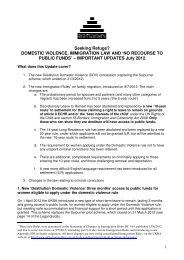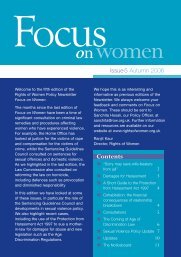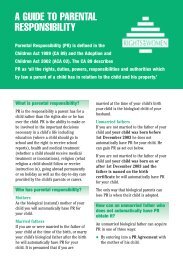Seeking Refuge? - Rights of Women
Seeking Refuge? - Rights of Women
Seeking Refuge? - Rights of Women
Create successful ePaper yourself
Turn your PDF publications into a flip-book with our unique Google optimized e-Paper software.
the UK and what travel documents you used to<br />
get here. These questions are important as your<br />
answers may be used to make a decision about<br />
whether or not you should be given protection in<br />
the UK. You must therefore explain why you fear<br />
being returned to your country.<br />
The screening process will also be used to find out<br />
whether you have claimed asylum before,<br />
whether you applied as soon as reasonably<br />
practicable, and whether you should be given<br />
financial support. For further information about<br />
financial support throughout the process, see<br />
Chapter 11.<br />
When you are screened, you will be given some<br />
basic information about the asylum process. You<br />
can also ask for a female case-owner (see below)<br />
and a female interpreter, if you would prefer to be<br />
interviewed by women. The UK Border Agency will<br />
try to ensure that you are interviewed by a woman<br />
whenever possible. You may have one case-owner<br />
throughout your case or have different case-owners<br />
at different times, for example, a female case-owner<br />
to interview you and a different case-owner to<br />
make a decision on your case.<br />
When your name and identity is confirmed, you<br />
will be given an Application Registration Card<br />
(ARC) to show that you have applied for asylum.<br />
This card is important as it confirms your status in<br />
the UK. If you are not given an ARC, you will be<br />
given a Standard Acknowledgement Letter<br />
(SAL) instead. The SAL is valid for a maximum <strong>of</strong><br />
two months and should come with instructions on<br />
how you can get a valid ARC.<br />
At the screening interview, it will be decided<br />
whether or not you should be detained while your<br />
case is decided. For further information about<br />
detention and the fast-tracking <strong>of</strong> cases, see<br />
Chapter 4.<br />
What happens if I am not<br />
detained?<br />
If you claimed asylum in the port or airport you<br />
arrived in, and you have not been detained, you<br />
may be given temporary admission. Temporary<br />
admission is not a grant <strong>of</strong> leave to enter the UK.<br />
It is an alternative to detention, but does not give<br />
you any other rights (such as the right to claim<br />
welfare benefits). A woman with temporary<br />
admission is usually forbidden from working and<br />
may be given certain conditions, such as<br />
reporting to immigration <strong>of</strong>ficials.<br />
If you claimed asylum in-country at an Asylum<br />
Screening Unit, and you have not been detained,<br />
you may be released subject to certain reporting<br />
restrictions. Reporting restrictions involve doing<br />
things such as reporting to a certain place at a<br />
certain time each week.<br />
If you had a type <strong>of</strong> leave to remain in the UK<br />
when you claimed asylum, for example, if you had<br />
permission to be in the UK as a student or worker,<br />
then this leave continues until a decision on your<br />
case is made.<br />
What happens after screening?<br />
The first reporting event<br />
After screening, you will be given the date you<br />
must first report to the UK Border Agency. At the<br />
first reporting event, you will be given a caseowner.<br />
It may be that you have the same caseowner<br />
throughout your case, or you may have<br />
different case-owners at different stages, for<br />
example, your asylum interview may be<br />
conducted by one case-owner, but the decision in<br />
your case may be made by another.<br />
At the first reporting event, your case-owner will<br />
explain the asylum process to you. You can ask<br />
any questions that you have about your case. If<br />
you do not have a legal representative (see<br />
below), the case-owner will give you information<br />
about how you can find one.<br />
“<br />
The case-owner is the person<br />
under NAM who is responsible<br />
for your case. You may have<br />
one case-owner throughout<br />
your case, or you may have<br />
different case-owners at<br />
different stages in the process.<br />
”<br />
23
















